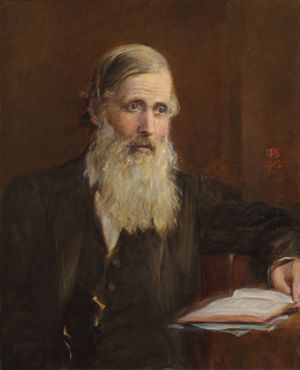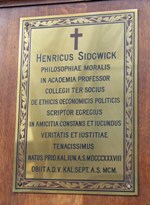Henry Sidgwick
1838-1900. Professor of Moral Philosophy. 
Sidgwick's father died when Henry was very young, and he was heavily influenced by E.W. Benson, a cousin of the family who eventually married Henry's sister - before becoming Archibishop of Canterbury. Eschewing a scholarship to Balliol, Sidgwick followed Benson to Trinity, where he won the Bell and Craven scholarships and the chancellor's medal, graduating with a double first, top of the list in the classical tripos and thirty-third wrangler in Mathematics, and elected a Fellow appointed assistant Tutor in Classics. His membership of ‘the Apostles’ gave him the opportunity for open-minded intellectual discussion on controversial topics. It was these gatherings rather than his formal education that revealed to Sidgwick his true vocation, which he later characterized simply as ‘thought exercised on the central problems of human life’ (Sidgwick and Sidgwick, 35).
Having lectured in Classics for ten years, in 1869 he exchanged his lectureship for one in moral philosophy, a subject to which he had been turning his attention. In the same year, deciding that he could no longer in good conscience declare himself a member of the Church of England, he resigned his fellowship; however Trinity immediately elected him to a lectureship (without a fellowship), which allowed him to carry on his teaching as before, and in 1881 was elected an honorary fellow. In 1874 he published The Methods of Ethics, by common consent a major work, which made his reputation outside the University. It was described by the philosopher C.D. Broad as ‘on the whole, the best treatise on moral theory that has ever been written’. His work on economics was also influential.
In 1875 he was appointed Praelector on moral and political philosophy at Trinity, and in 1883 he was elected Knightbridge Professor of Philosophy. In 1885, the religious test having been removed, Trinity once more elected him to a fellowship on the foundation.
Besides his lecturing and literary labours, Sidgwick took an active part in the business of the University, and in many forms of social and philanthropic work. He was a member of the General Board of Studies from its foundation in 1882 till 1899; he was also a member of the Council of the Senate of the Indian Civil Service Board and the Local Examinations and Lectures Syndicate, and chairman of the Special Board for Moral Science. He was one of the founders and first president of the Society for Psychical Research, a member of the Metaphysical Society, and promoted the higher education of women.
Cambridge University's Sidgwick Site is named after him.
| Memorial inscription | Translation |
|
HENRICUS SIDGWICK PHILOSOPHIAE MORALIS IN ACADEMIA PROFESSOR NATUS PRID.KAL.IUN. A.S.MDCCCXXXVIII |
Henry Sidgwick, Litt.D., was Professor of Moral Philosophy in the University and three times a Fellow of the College. A distinguished writer on ethics, economics and politics, he was a loyal and cheerful friend, and always held fast to truth and justice. He was born on 31st May 1838 and died on 28th April 1900. |
Henry SidgwickBrass located on the north wall of the Ante-Chapel. |
Click on the thumbnail for a larger image. |
|
|
PREVIOUS BRASS |
|
NEXT BRASS Frederick Arthur Simpson |
| Brasses A-B | Brasses C-G | Brasses H-K | Brasses L-P | Brasses R-S | Brasses T-W |

